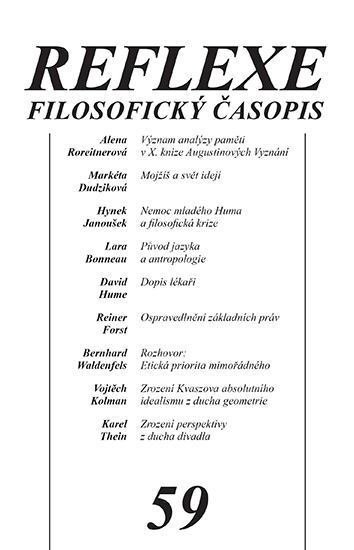Nemoc mladého Huma a filosofická krize
The Young Hume’s Malady and the Philosophical Crisis
Author(s): Hynek JanoušekSubject(s): Early Modern Philosophy
Published by: Univerzita Karlova v Praze, Nakladatelství Karolinum
Summary/Abstract: The first part of the article presents a commentary on Humeʼs famous letter to a physician, especially with respect to both the psychological and the physiological impact of enthusiasm on the human mind. The second part attempts to integrate and deepen the insights thus gained into a broader picture of Hume’s concept of mind in his Treatise of Human Nature and in some of his early essays. Hume’s cautious view of philosophical enthusiasm in his early work is analyzed against the background of his discussion of religious and poetic enthusiasm. The strong impact of philosophical ideas on the imagination initially seems to alleviate the mind’s inherent dependency on external objects. However, the abstract nature of philosophical ideas is not strong enough so as to sustain the activity of the imagination over a longer period of time. The article discuses three features of this abstract nature: the general character of philosophical ideas; abstraction from the perceived world; and the complexity of arguments. It further shows that according to Hume, operations of sympathy are needed to supplement and invigorate philosophical thought if it is to be sustainable. These operations bind the philosophical results of lonely thinking to emotions of its recipients, thus making it impossible to think in isolation from the outside world. The text also argues that while radical skepticism is one of the worst sinners against this natural “sympathetic” condition of thinking, the causes of the potential malady caused by philosophical thought are conceived by Hume more broadly and not as exclusively limited to radical skepticism.
Journal: Reflexe
- Issue Year: 2020
- Issue No: 59
- Page Range: 81-104
- Page Count: 24
- Language: Czech

